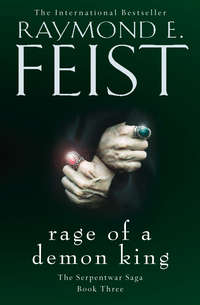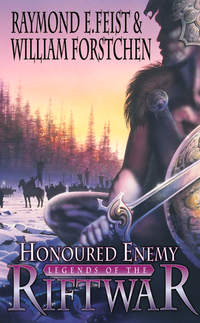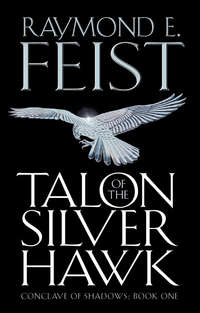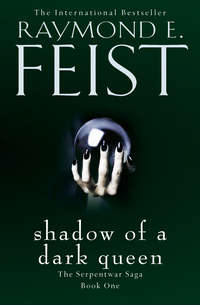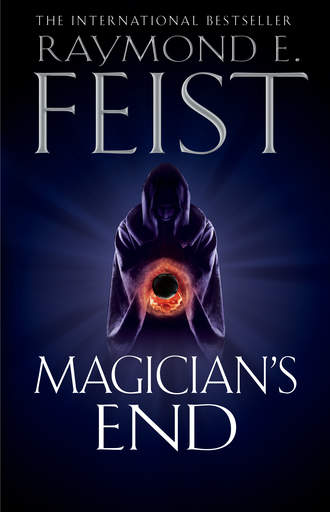
Полная версия
Magician’s End
They forged across the bed of a long-absent sea. As they trudged across the rough channels and gullies, Miranda asked, ‘Why are we walking?’
Guide said, ‘You have a better alternative?’
With an all-too-familiar smug smile, she glanced at Pug, then vanished.
A hundred yards ahead they heard her scream.
Scrambling as best they could across the broken, sun-baked sands of the dry sea bottom, they reached her quickly, finding her sitting up, a look of confusion on her face as she held her hands to her temples.
‘That which you call magic,’ said Guide, ‘does not respond here as it would in your own world.’
‘But what of the protective spells we employed?’ asked Magnus.
‘Did it not occur to you that it was surprisingly easy to create those protections against this world’s energy states?’
Magnus nodded. ‘Now that you mention it, it was easy.’
Nakor chuckled as he and Pug helped Miranda to her feet. ‘Different energy states, my friends,’ said the bandy-legged little man. ‘If you light a small pot of oil, you get a flame to read by. If you refine and distil that same oil and light it, you get a really big, hot flame.’
‘In time you should be able to learn to temper your arts to transport yourself from place to place,’ said Guide. ‘But we do not have the time for you to learn. Rather, you do not have that time. So, we walk.’ With that he began walking again.
Pug asked Miranda, ‘Are you all right?’
‘Besides feeling supremely foolish, yes.’ She glanced up and saw the concern in his eyes. ‘Sorry.’
Pug felt conflicting urges to say different things at once, paused, then nodded.
Time passed and they forged on. Guide provided illumination as they traversed the broken seabed. He created bridges as they crossed massive trenches in the former ocean’s floor, and seemingly kept them alive by some magic that rid them of need for food or water.
But they did need to rest, even if only for short periods, while they regained strength rapidly in this high-energy-state universe.
During one such rest, Pug asked, ‘Are we to know why you’re here?’
Guide answered, ‘I am here as willed by One.’
Pug couldn’t help but laugh. ‘When I was a Tsurani Great One on Kelewan, my every command was answered by “Your Will, Great One”, ah … for some reason this strikes me as humorous.’
A great wave of sadness swept over Pug as he remembered Kelewan. Since his actions had destroyed that world and countless lives on it, he had effectively walled off the profoundly deep sorrow and guilt associated with that terrible decision. Yet from time to time, usually when he was alone, it would return to haunt him.
‘How are you able to keep hunger and thirst at bay for us?’ asked Nakor. ‘It’s a very good trick.’
Guide shrugged. ‘The universe is aware, on many levels. My perceptions and knowledge are vastly different to your own. What I need to know, I know. What I do not know, I do not know.’ He shrugged. ‘You are mortals, and in need of food and water, so I provide such …’ He waved his hand as if the concept was alien to him and difficult to explain. ‘I just make it so, you are fed; you have drunk … what is needed.’ Then he opened his eyes slightly and said, ‘Ah, curiosity!’
‘You have none?’ asked Magnus.
‘I am created for a purpose,’ said Guide.
Nakor laughed. ‘We all are.’
‘But my purpose is unique and short-lived. Once I start you on your way home, I will have completed my task and cease to exist in this form,’ said Guide. ‘I will return to the One and rejoin the Bliss.’
‘Who sent you to find us?’ asked Magnus.
‘The One,’ said Guide with a tone that suggested it was obvious.
‘Why here?’ asked Nakor, fixing Guide with a narrow gaze. ‘Why not on Midkemia before we destroyed an entire city and the best part of a race?’
Guide cocked his head for a second as if considering. ‘I do not know.’ He closed his eyes for a moment, then opened them and said, ‘Rider.’
‘What rider?’ asked Miranda.
‘Rider. She was sent by the One to warn you.’ He pointed at Pug. ‘But she was … prevented.’ His face became a mask of confusion. He stood up. ‘Come. We must hurry. Time grows short.’
‘How much farther?’ asked Magnus.
‘Why the sudden hurry?’ asked Miranda.
‘I can only know what I am to know.’ Guide now looked completely confused. ‘Your questions will … be answered as it is … as the One …’ Frustration overcame him and he almost shouted, ‘I do not know why these things are so! I am only a means of …’ He continued in an almost alien voice, ‘I am only a means of expression, an interpreter if you will, of a higher mind which must carefully choose how to touch you without harm. Your lack of belief in the form your minds chose … it is wearing on me. Come, I will take you to someone who may be better able to answer these and other questions.’
They trudged along and Pug said, ‘When we pulled Macros back from his attempted ascension into godhood, I remember him describing his experience as seeing all of vast creation through the knothole of a fence, and as we pulled him back his perspective shifted and he saw less and less.’
‘Yes?’ asked Miranda.
‘He later explained that the other aspect of the experience was that the closer he got to that fence, the less of his “self” remained; as he ascended to godhood, identity faded as consciousness expanded.’
Guide said, ‘Yes. The One could simply impart knowledge, but it would overwhelm you. For you to know, but to be squatting on the side of a hill, unable to move because your mind was damaged, that would serve no one.’
‘That’s hard to deny!’ said Nakor.
They moved as best they could over the broken terrain and at times found themselves facing seemingly insurmountable obstacles, for they were moving down a miles-long slope that wended its way through once-undersea mountains. Yet Guide always seemed to find a way, even if it was treacherous.
Finally they crested a rise and he pointed. ‘There!’
In the distance they could see a vast table of land, surrounded by deep trenches. Pug said, ‘Those crevasses are vast. Can you fashion us a bridge that far?’
Before Guide could answer, Magnus said, ‘I think I can get us there.’
Miranda looked at him. ‘Are you certain? I found the short excursion I attempted very painful.’
‘I’ve been attuning myself as best I’m able to the energy states here …’ Magnus paused and they both knew he had almost called her ‘Mother’, and a smile was exchanged. ‘I doubt it will be pain-free, but I think I can manage this one attempt without incapacitating myself. As I can see our destination, much of the risk is abated.’
Pug and Miranda glanced at one another, then at Nakor, who nodded. ‘It’s been a long time since I tried to forbid you a risk,’ said Pug. He took Magnus’s hand as Miranda and Nakor joined hands, and Nakor grabbed Magnus’s arm. Pug gripped Guide’s arm with his free hand and found it unexpectedly cold.
Suddenly they were standing on a plateau miles from where they had been a moment before. Pug looked at his son and saw Magnus’s expression was pained, and perspiration was beading on his forehead. His pale complexion was drained of what little colour he normally possessed. He shook his head slightly and said, ‘I’ll be fine in a moment. If we have to do it again, I can adjust. This is not the easiest adjustment I’ve made, but it’s not the most difficult either.’
‘I’ll take your word for it,’ said Nakor, then he pointed past Guide. ‘Who’s that?’
Guide didn’t look, but said, ‘That is Pepan the Thrice-cursed.’ Then he vanished without a word.
The being left before them was as alien a creature as any of them had met, and in demonic form Nakor and Miranda had met many. He, if gender could be determined, was as miserable-looking a creature as any had seen. His head was three times the size of a normal man’s, but the body was slender and seemed barely able to hold it up. A bulbous stomach protruded so far that only the lower portions of spindly legs where it sat could be seen, and the arms were almost withered.
His face was long, from an almost hairless pate to a long, broad jaw, and a nose covered in pustules and scabs was at its centre. Rheumy eyes of pale blue surrounded by jaundiced yellow shed a constant stream of tears and heavy lips generated a constant flow of froth and bubbles.
Miranda said softly, ‘I’ve seen worse.’
Nakor said, ‘I’m older than you. No you haven’t.’
The creature seemed unaware of them until Pug ventured closer. ‘You are Pepan?’
‘That’s what Guide said,’ snapped the creature angrily. ‘Do you see anyone else here?’
Nakor pressed forward, his insatiable curiosity pushing aside other considerations. ‘Tell us why you are called the Thrice-cursed.’
‘Listen and be wiser for it, mortal!’ shouted the creature. ‘In this world once was I a man among men, a king among kings, a being of power and wealth, wisdom and beauty. Did I sit upon thrones and did subjects tremble at my beauty? Yes! Did I possess all that any man might desire? Yes!’
Pug saw Miranda about to interrupt and slightly shook his head to indicate he wanted to hear this tale: perhaps there was knowledge to be gained here.
‘In my arrogance I did conspire to elevate myself beyond the wealth and power I had, to rise to the heavens and seek a place among the gods.’
Nakor grinned, and nodded. ‘Go on.’
‘In my vanity, I did create engines of destruction unmatched in the history of my people. Nations I conquered to gather mighty armies around me: those who were vanquished served or died.
‘Then in the tenth age of my reign, I came here to the Tent of Heaven, and led my hordes up the Path of the Gods, to the top of the tallest mountain on this world!’
Nakor glanced around, for they were on what had once been an undersea plateau. ‘I see no mountain, Pepan.’
‘Washed away by the ocean, for no sooner had I approached the Gates of Heaven to demand my due as the newest of the gods, they picked up the entire mountain and thousands of my soldiers fell screaming to their deaths. Then, for my vanity, the gods cursed me by washing away all knowledge of me, sweeping my people into the sea with me, while I was chained to that very mountain. I listened to their screams of terror and pleas for mercy, until there was only silence.
‘Then I knew the price of vanity, perhaps the worst of all sins, for alone I waited, eons passing as the waters wore away the very rocks to which I was chained. The sea became my home and I abided.
‘Above, time passed; I had but scant knowledge of it, only suggestions carried to me on fickle tides. A strange scrap of fabric, unlike any I had beheld, drifted close and I seized it. I wondered who had woven it and what manner of creature now walked in the world above me. I treasured that fabric until the salt of the water had faded it and the very fabric wore away.
‘Once a ship passed directly above, blocking out the faint light of the sun as it passed. I wondered who voyaged upon it, from whence they came and where they were bound.
‘As the mountain wore away, sections sheared off and I was carried deeper into the depths, until no light reached me from above.’
Miranda said, ‘That is far more than three curses; that’s damnation without ending.’
‘But there you are wrong, mortal!’ shouted Pepan. ‘For after a time I found peace, an acceptance of my lot. I was content to let my mind go void, to simply be in harmony with the rhythms of the sea.
‘Angry gods at last took note of my peace, and chose then to inflict the second of my curses. A day, a month, mere moments, I do not know how long passed, for time had become meaningless to one dwelling blind in the depths of the sea, but suddenly the waters receded and I was again in the light and air! Fire rained down from above, and majestic clouds of flame and ash tore across the heavens as war on a scale unimagined by mortals raged across the land. Engines of destruction vast beyond my imagining, making my proud fleet seem like mere toys, cruised the skies, delivering obliteration to all below.
‘Mortals in armour unlike any seen before hurried across broken lands with lances of red light and fire-belching engines on treads, destroying all before them.
‘Then hordes of demons appeared, sweeping mortals away as a scythe shears grain, and answering them was a host of angels, swords aflame, horns sounding notes so pure that I was reduced to weeping at the first note.
‘This world was torn asunder and oceans vanished as energies hotter than a star burned across the lands. And yet I abided.’
He fell silent for a moment, and to the four travellers it was unclear if he was merely organizing his thoughts or experiencing some emotion at the memory of this unbelievable narrative.
‘So, in sum, my second curse was to watch any shred of a thing I might have loved destroyed in the war between gods and men.’ His voice softened. ‘A war I began. Ages passed and my third curse was made apparent.’
‘What is that?’ asked Nakor.
‘Upon this world remain scattered remnants of nations, which I gathered.’ He pointed to the assembled bits and scraps he had cobbled together to make a shelter. A bit of something served as a chair; there was also an ancient-looking table. Shreds of fabric had been woven together into a quilt. Pepan himself wore a simple breechclout that was revealed when he finally stood up.
‘For uncounted days I wandered, gathering what I could find, always to return here.’
‘Why here?’ asked Magnus. ‘There must be more hospitable places on this world.’
‘Not really,’ answered Pepan. ‘And this is where the gods left me. This is where I am to abide. I no longer rebel but I do question.’ Raising his eyes to the sky, he shouted, ‘I was a sinner, All Father! I admit my transgressions, All Mother! I sinned most of my days!’ His voice broke. ‘But not every day. I lived but a few score years, yet I have paid for my sins for an eternity.’ With a sob, he whispered, ‘Enough, please.’
Just as Pug and the others were verging on sympathy for the abject creature, Pepan erupted in a howl of rage. ‘And my third curse, most hateful of all, making me the gatekeeper!’
‘Gatekeeper?’ asked Nakor.
‘See you then, mortal, that the ultimate jest piled upon me by the gods is that when those who wander this destroyed world, or who fall here from some other realm, when at last they find their way here, I am obliged to help them on their way. I cannot, even out of lonely spite, keep them here to mitigate my endless sorrow through pleasant discourse, nor may I exchange tales of lives spent in other realms, but rather I must endure solitude.
‘For upon your arrival, I began to feel pain, and with each passing minute the pain increases. It will not cease until I send you on your way, returning to my isolation. I may not end the suffering by my own hand or the hand of another,’ he sobbed. ‘Alone on this world I am immortal and indestructible.’
‘Why endure the pain?’ asked Magnus. ‘Why tell us your tale? Why not just hurry us along?’
‘The pain is a price worth paying to interrupt my loneliness,’ Pepan said, weeping openly. ‘Now it must end.’
He waved his hands in precise pattern and a vortex appeared in the air. It was obviously an opening of some sort, but as they readied themselves to leap through it, Pepan held up his hand. ‘Wait!’
‘What?’ asked Pug.
Pepan closed his eyes, tears now streaming down his cheeks. ‘Each of you must follow a different path.’
‘We must split up?’ asked Miranda, obviously not happy with the idea.
‘Apparently,’ said Pug. ‘If someone laid a trap for the four of us, then it’s literally set for the four of us.’
‘It waits for all of us,’ said Nakor. ‘Yes!’ His expression turned gleeful. ‘You do not spring a trap on soldiers when only the scout is there: you wait for all of them to gather.’
Pepan’s expression now contorted into one of abject pain. He waved a hand and the size and colour of the vortex changed, growing smaller and tinged with orange energy. ‘You!’ he said, pointing at Nakor.
Without a word, Nakor leapt into the vortex.
Again Pepan waved his hand and the colour of the vortex changed to a faint, shimmering blue. ‘You,’ he said, pointing at Miranda.
She glanced at Pug and Magnus, hesitating for a brief moment, then with a quick nod she leaped into the swirling air and vanished.
Again the colour changed, this time to a brilliant white, and Pepan pointed at Magnus. Without hesitation, Pug’s son jumped into the magic portal.
One more wave and Pepan said, ‘I am to tell you one thing, magician.’
‘What?’ asked Pug. He watched the vortex turn dark until it became a black maw.
‘This is the beginning of the end. You will meet your companions again, but only at the most dire moment, when you must all be ready to sacrifice everything to save everything.’
‘I’m not sure—’
‘Go!’ commanded the wretched creature, and Pug obeyed.
He ran and jumped, crouching as he entered a cone of darkness.
• CHAPTER TWO •
Confrontation
SHIPS DOTTED THE HORIZON.
Hal stood on the battlements of the royal palace at Rillanon, at its heart still a castle, but one which had not seen conflict for centuries. This portion of the ancient rampart, a large, flat rooftop of thick stonework, had once supported war engines defending outer walls long torn down to expand the royal demesne. A fortification that once hosted massive ballista had been converted to a garden, one lush with flowers as summer faded. The stone merlons had been replaced in centuries past with a stone balustrade cleverly carved to be both strong and graceful. Yet the footing beneath Hal’s boots felt as solid as the palisades of Crydee Castle had. And given the forces gathering below, he wished those long-gone outer walls were once again in place here in Rillanon, with ballistas and trebuchets instead of fading blooms.
He let out a slow breath. It was hard to find ease, despite the rigours of the past few weeks fading into memory as troubles associated with fleeing Roldem with the Princess Stephané had been replaced by troubles on a far grander scale. His personal distress over knowing he would never have the woman he loved had been made to seem a petty concern in the face of the threats now confronting his nation.
Yet he was constantly haunted by her memory, along with his friend Ty Hawkins, who had spirited her away from her home and brought her safely to the Kingdom. All of it seemed unreal at times, yet other times it was vivid. Every detail of Stephané was etched in his memory: the grace of her movement, the laughter as she found delight in small things, her worry for those she loved. He struggled to let go, even though he knew that to wallow was to prolong the pain.
He glanced around, and saw his brother Martin was looking his way. Martin inclined his head: a wordless gesture asking if he was all right. Hal returned a slight nod. Their brother Brendan, standing beside Martin, had his attention fixed on the ships in the harbour. Hal turned his attention that way as well. Nearby stood Lord James, Duke of Rillanon, and his grandson Jim Dasher.
Rillanon’s harbour was south of the palace, at the bottom of the hill. Sails had been appearing on all quarters of the horizon for days: hundreds of ships from every port on the Sea of Kingdoms. This ancient island nation had seen fleets such as these, but not in living memory. War had not touched this soil, the ancient home of Hal’s ancestors, in centuries. The prime motive for conquering the surrounding islands and nearby coasts for Hal’s forebears had been fatigue from continuous clashes with minor warlords and raiding clans across these waters. The constant need to defend the home island had turned a relatively peaceful community of fishermen and farmers into the most effective army north of the Empire, creating the second largest nation on this world.
It had been a triumph of the Kingdom of the Isles that this city and the king’s palace could do without the massive defence works, as the king’s navy for centuries had become ‘the wall around Rillanon’. Now that navy was divided. No man could look out upon that sea, and the many sails upon it, and judge just who they were defending: Edward, Oliver, or some other faction. That irony was not lost on Hal.
He couldn’t find ease because he could smell war coming on the afternoon breeze. And unlike the struggle against Kesh, this was the war to be most feared by any noble in the Kingdom: a civil war.
Hal knew the Kingdom’s history well. A determined ruler named Dannis had united all the clans of the island, and his descendant, Delong, had been the first conDoin ruler to establish a foothold on the mainland. After the sack of Bas-Tyra – a rival village that had risen in power to challenge Rillanon – he had not returned to the island stronghold, but had forced the ruler of that city state to swear fealty to Rillanon in exchange for his life and the lives of his followers, creating the Kingdom of the Isle’s first mainland duchy and elevating Bas-Tyra to the rank of second most important city after the capital. That first victory had led to many others, as Rillanon and Bas-Tyra’s combined might had overwhelmed Salador and the southern coast. Only the Eastern Kingdoms, with the help of Roldem, had stemmed that early Kingdom expansion.
Now the ruler of that city stood to Hal’s right asking, ‘What is Oliver thinking?’ Duke James of Rillanon looked at both Hal and the man on Hal’s left, James’s grandson, Jim Dasher Jamison, head of the Crown’s Intelligence Service.
‘He’s not thinking,’ Jim said sourly. ‘Or he’s thinking that some here might object to a foreign-born king, so he’s brought along a few friends.’
Hal glanced at his two brothers, and Martin nodded. Hal knew what Martin also understood: somehow the three conDoin brothers were about to take a part in all this, but what that part would be had not yet been revealed.
The ‘friends’ were the bulk of the army of Maladon and Simrick, bolstered by a substantial number of levies and mercenary companies which were now encamped, as they had been for a month, beyond the walls of the city. The old military grounds lay to the east of the harbour, having once been the staging area for Rillanon’s conquering armies waiting to board ship. Not in a generation had they been used as originally intended, having been converted to a shanty town and impromptu market. Oliver had cleared the area, displacing many of the poor and working poor, and had camped his army there.
Many polite messages had been exchanged between those inside and outside the walls, and the longest interregnum in the history of the Kingdom was underway. By tradition, the Congress of Lords met for the election of the new king three days after the dead king’s internment in the vault of his ancestors.
But for the first time in history, more than a month had passed since the death of a king without the Congress of Lords being formally convened. One excuse or another had been provided, and each faction negotiated furiously behind closed doors, over quiet suppers, or in dark back alleys, but everyone knew exactly what was really taking place: every claimant to the throne was desperately seeking a resolution to the succession without losing their position and without plunging the nation into a civil war it could ill afford. And for the time being, those two goals seemed mutually exclusive.
The senior priests of the Temple of Ishap in Rillanon, the most venerated order in the world, would formally conduct the ceremony, but only when summoned by the Congress to do so. Since the ascension of Lyam the First, no dispute had existed in the line of kings from Lyam to his nephew Borric, to Patrick, then Gregory.
Now, no heir had been proclaimed, and no clear ties by blood were forthcoming. Politics had seized the nation by the throat. Three factions had asserted themselves, all with roughly equal and valid claims, none of which was seen as compelling by those gathered on the balcony this afternoon.


